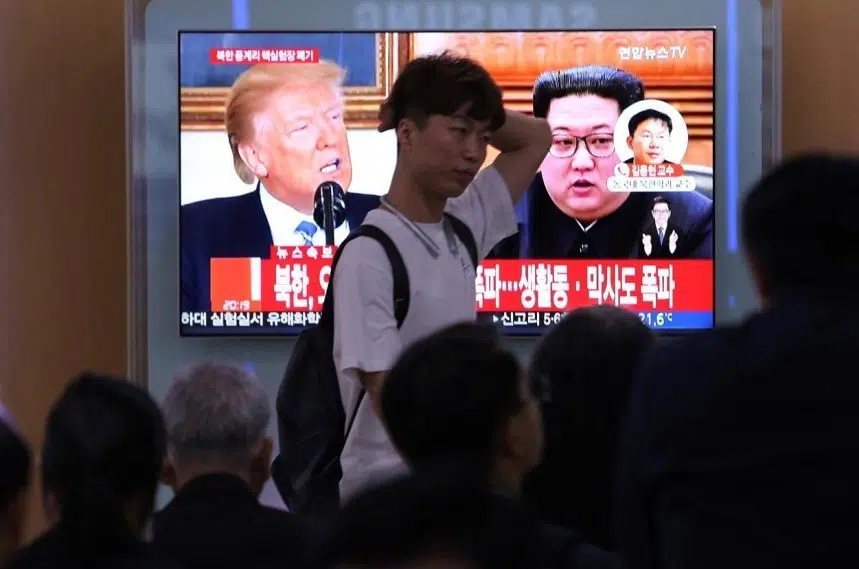WASHINGTON — In a dramatic diplomatic turn, President Donald Trump cancelled next month’s summit with North Korea’s Kim Jong Un Thursday, citing the “tremendous anger and open hostility” in a recent statement by the North.
Trump said in a letter to Kim released by the White House that, based on the statement, he felt it was “inappropriate, at this time, to have this long-planned meeting.” Adding his own threat, he said that while the North Koreans talk about their nuclear capabilities, “ours are so massive and powerful that I pray to God they will never have to be used.”
In the Korean statement that Trump cited, the North referred to Vice-President Mike Pence as a “political dummy” for his comments on the North and said it was just as ready to meet in a nuclear confrontation as at the negotiating table.
Trump said his letter: “If you change your mind having to do with this most important summit, please do not hesitate to call me or write.”
He said the world was losing a “great opportunity for lasting peace and great prosperity and wealth” now that their June 12 summit has been cancelled. Secretary of State Mike Pompeo read the letter during a hearing before the Senate Foreign Relations Committee Thursday.
The president had agreed to the historic sit-down in March after months of trading insults and nuclear threats with the North Korean leader. But after criticism from North Korea, Trump cast doubt this week on whether the meeting would happen.
A White House official said it was incorrect to focus on the “dummy comments” about Pence. The official said the North Koreans had threatened nuclear war in their statement released Wednesday night and no summit could be successful under these circumstances.
The official spoke on condition of anonymity to discuss internal deliberations.
White House officials have privately predicted for weeks that the summit could be cancelled once or twice before actually taking place, owing to the hard-nosed style of the two leaders. Trump has seemed to welcome chatter of a Nobel Peace Prize, but that has yielded in recent weeks to the sobering prospect of ensuring a successful outcome with the Kim.
Trump’s allies in Congress applauded the president, saying he was justified in pulling out of the meeting.
“North Korea has a long history of demanding concessions merely to negotiate. While past administrations of both parties have fallen for this ruse, I commend the president for seeing through Kim Jong Un’s fraud,” said Sen. Tom Cotton, R-Ark., who said the nation’s “maximum-pressure campaign on North Korea must continue.”
This spring, scoring a diplomatic win with Pyongyang had become Trump’s top focus.
That had been a far cry from his bellicose rhetoric, issued both on Twitter and from the rostrum of the United Nations last fall. Trump threw off ominous taunts of raining “fire and fury” on the North while belittling its leader as “Little Rocket Man, alarming many global capitals and much of Washington’s national security establishment and increasing worries about nuclear war. But Trump believed his outside-the-box behaviour would bring Kim to the negotiating table.
Drawn to big moments and bigger headlines, Trump has viewed the North Korea summit as a legacy-maker for him, believing that the combustible combination of his bombast and charm already had led to warmer relations between North and South.
He immediately agreed to the proposed meeting, conveyed by South Korean officials, accepting it before consulting with many of his top national security advisers. And earlier this month, when welcoming home three Americans who had been detained in North Korea, Trump used a televised, middle-of-the-night ceremony to play up both his statecraft and stagecraft.
Some observers raised concerns that Trump was risking legitimizing Kim’s government by agreeing to meet him on the world stage without evidence of denuclearization or other concessions. But Trump had bet big on the summit, telling one confidant that he believed a deal with North Korea, rather than in the Middle East, could be his historic victory.
White House officials also believed that a triumph on the Korean Peninsula — something that has eluded the United States for generations — could bolster Trump’s approval ratings, help inoculate him against the investigations swirling around him and trickle down to help Republicans in this fall’s midterm elections.
___
Associated Press writers Ken Thomas, Darlene Superville and Jonathan Lemire contributed.
Catherine Lucey And Zeke Miller, The Associated Press







